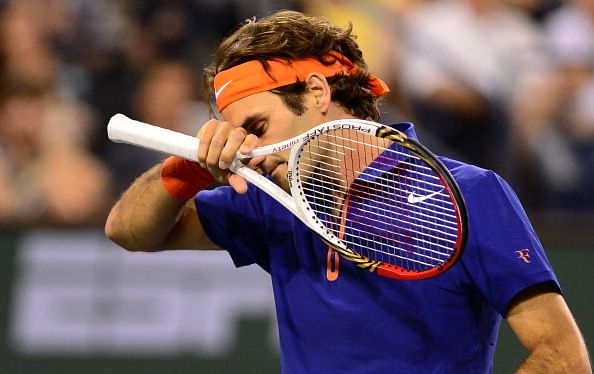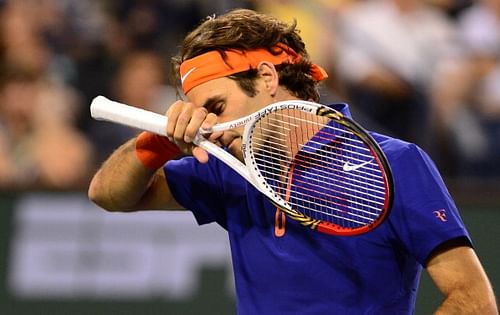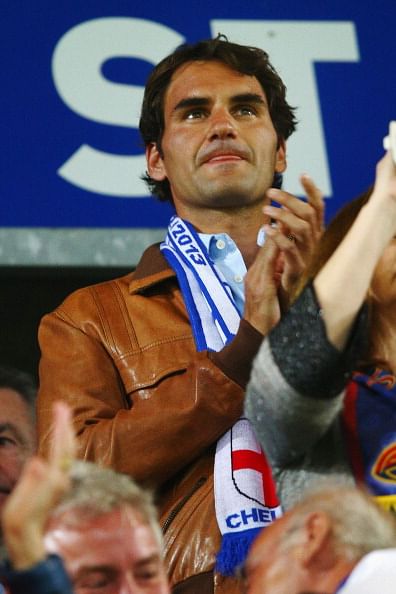
The mid-life predicament of Roger Federer

Roger Federer of Switzerland, pictured here during his BNP Paribas Open quarterfinal on March 14, 2013, reacts after losing a point against Rafael Nadal of Spain in Indian Wells, California. Nadal won 6-4, 6-2. (Getty Images)
At 31 – the best part of 25 years spent on tennis courts – Roger Federer is dealing with the poignant effects of time. The soul is dancing alright, even though the body seems out of step at times. A genius still resides in his fecund mind, but the limbs do not always resonate to its strains of brilliance. Of course, he is still a magician who can set ice on fire. Unfortunately his wand isn’t as reliable as it once was, often letting its master down just at the moment of reckoning. The final chapter in the brilliant saga of Federer could still prove to be a climax worthy of a magnum opus, but the ice in the champagne bucket is fast melting.
Federer, no doubt, can feel the water under his feet. As a seasoned practitioner with a firm grip on the nuances of his craft, the Swiss is already carving himself a suitable space to avoid sinking the boat. Federer seems to have embraced a moderate schedule interspersed with rest and vacation as the mantra in his quest to prolong his prolific career. And the rules of the ATP World Tour are coming to the aid of the ageing genius.
The ATP allows players to drop a Masters Series event without inviting penalty when they meet any of the following criteria –
a) Complete 600 matches on the ATP World Tour
b) 12 years of service on the tour
c) 31 years of age
A player who meets all of these three conditions is allowed an unconditional exemption. It means that the player could only opt to play the tournaments of his choice, without inviting a financial penalty. Federer is the first professional to meet these three requirements. And the Swiss is not loath to scheduling his calendar to nurse himself into shape. After all, longevity has always been one of Federer’s barometers for success.
Federer’s plans for 2013 include a seven week break between Indian Wells and Madrid this week, four weeks of rest between Wimbledon and Montreal and a further four between the US Open and Shanghai. The world No.2 has already skipped two Masters series events this year – Miami and Monte Carlo. The rest is well deserved and could even help the maestro rejuvenate and stay fresh. But life on the tour is a demanding circus and the Swiss is all too aware of its many foibles. To preserve or persevere – this in essence is the dilemma facing Federer.
The consistency of the Swiss maestro is a tough act to emulate, even if the maestro himself tried all over again. And that awareness is nudging Federer to take an unconventional approach to sustain his brilliant aura. It remains to be seen whether the results stack up well for the genius from Basel, whose first foray on clay this season will be on Tuesday. With only Madrid and Rome left to go before the pilgrimage to Roland Garros, Federer will hope for a deep run at both tournaments.

The Swiss ace has taken time off to go on vacation with his family and also watch football club FC Basel in action. Federer watched on from the grandstand during their UEFA Europa League semifinal First Leg against Chelsea at St. Jakob Stadium on April 25, 2013. (Getty Images)
By Federer’s lofty standards, 2013 has been a modest year thus far. The Swiss has a 13-4 record and is still searching for a first final this season. The downside of Roger’s limited schedule is the constant pressure on his ranking. With the top players consistent most of the time, Federer is at risk of sliding down the ladder if he suffers a couple of poor results. Andy Murray is hot on the heels of Federer, only 100 points adrift in the rankings released this Monday.
Rafael Nadal hasn’t withered one bit despite being away from the game for seven long months. In fact the Spaniard has reached the finals of each of the six events since his comeback in Chile. Nadal is the only man to have won four times this season. David Ferrer is also 31, but he is showing no signs of cooling down as he keeps up his gruelling playing schedule. Unless Federer keeps up with his neighbours, he could very soon face the prospect of facing Novak Djokovic, Nadal or Murray at the quarter-final stages of the big tournaments.
Federer though seems to believe that the rest is exactly what the doctor ordered. The Swiss player’s hypothesis will be put to test this week in Madrid and then in Rome. If Federer can make the weekend at these events, it would vindicate his thought process. If not, the Swiss will expose himself to intense scrutiny about his declining fortunes.
“I’ve just been home and practising hard as I was hoping to. I feel good now,” emphasised Federer to the press corps in Madrid. “It took me a little time to get over my back issue from Indian Wells. But at the same time, that collided with my vacation anyway, which was okay, so I didn’t lose much time there. For me, it was important to take a bit of a rest – not too long – just enough so I’m really sort of tough to beat in the next few months,” added Federer while describing his immediate aspirations.
Over the next few months, we will learn plenty of things about Federer just as he might about himself. It will be interesting to see how he responds to the growing demands of his family alongside a waning career on the winding path towards the Olympics in 2016. Federer will be almost 35 in Rio. It will be nothing less than educating to experience how Federer deals with his career as he keeps himself on the winding road to the next Olympics. No matter where the journey takes him, it will be an enthralling sight to watch the maestro deal with the inescapable effects of time.